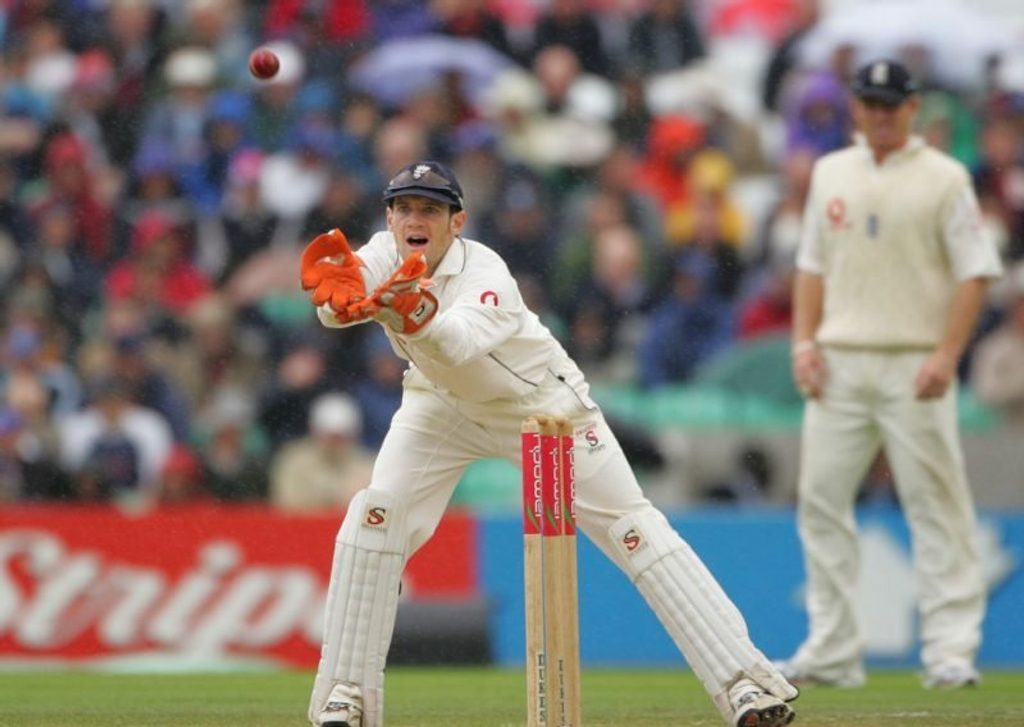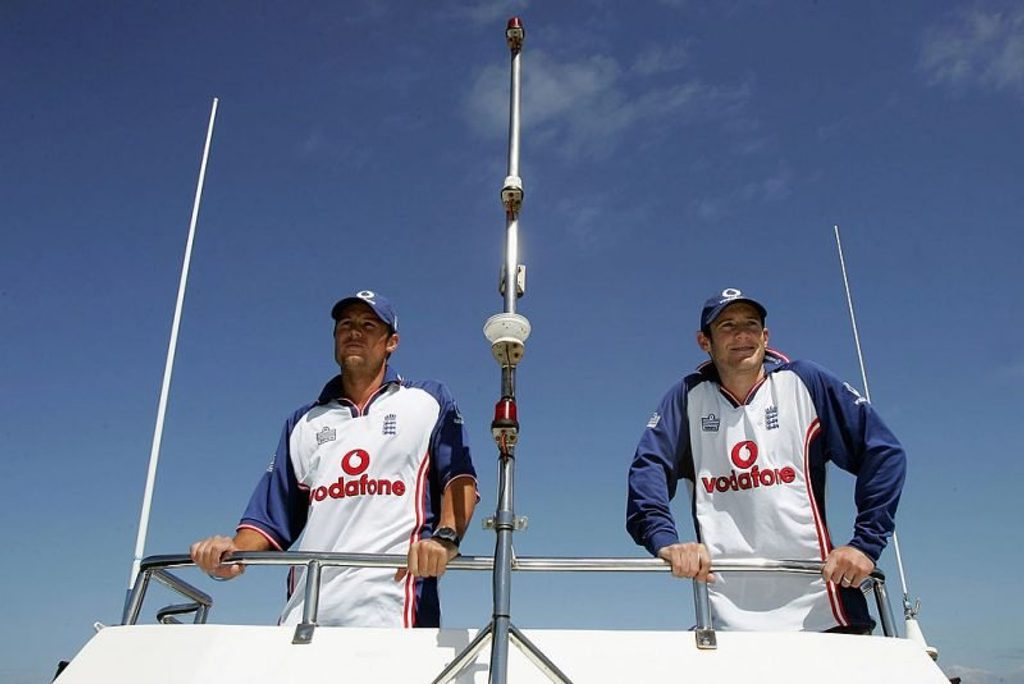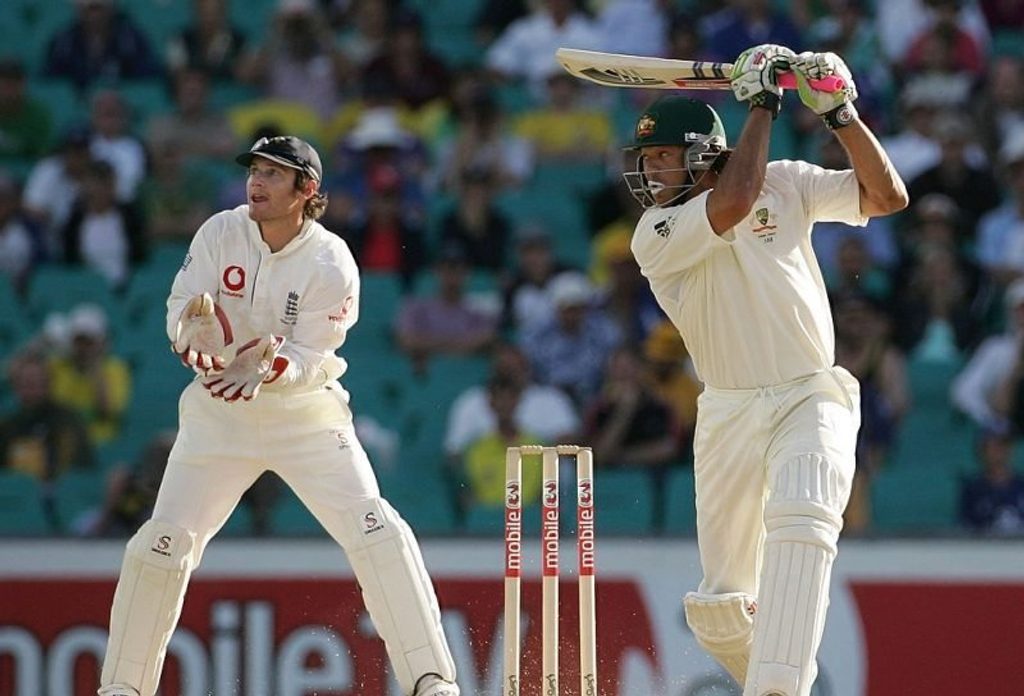
Despite being an exceptionally gifted glovesman, Chris Read’s international career never truly took off. He looks back at it with Wisden Cricket Monthly magazine editor Jo Harman.
At the age of 22, two years after becoming England’s youngest Test wicketkeeper for more than a century, Chris Read was described by Rod Marsh as the best English stumper he’d witnessed since the great Alan Knott. And yet just six years later, when Read was nearing his peak as both a keeper and batsman, he had already played the last of his 15 Test matches – an England career that had begun in a hurry drawing to an unhappy close following public criticism from his own coach.
Read’s maiden Test call-up for the 1999 home series against New Zealand had been most unEnglish; a bold look to the future which in hindsight neither he nor England were really ready for. He had been fast-tracked through the system after impressing for England under 19s, appearing for England A on the 1998 tour of Kenya and Sri Lanka before he had even played first-class cricket for his county.
With Jack Russell blocking his path into the first team at Gloucestershire, Read signed for Nottinghamshire ahead of the 1998 season and quickly established himself a first-team regular. When he scored his maiden first-class hundred the following June, England – under new captain Nasser Hussain – decided they had seen enough and two weeks later handed the 20-year-old his Test debut against the Kiwis at Edgbaston.
“They were looking to play Alec Stewart as a batter, and we were in the pre-Gilchrist era where in the first-class game the batting side of things wasn’t considered quite as important [for wicketkeepers],” says Read, who was averaging 28 at the time. “The selectors had an eye on the future so I can see how it made sense. But was I ready? Absolutely not.
“I’d played about one season’s worth of first-class cricket and had done pretty well but the difference between a four-day county game with a couple of hundred members in the ground versus a full house and the media scrutiny that went with a Test match was a real eye-opener and something that I wasn’t really prepared for.”
Having made 1 in his only innings at Edgbaston, Read walked out to bat under gloomy skies on day one of the second Test at Lord’s and was infamously bamboozled by a Chris Cairns slower ball, attempting to duck a delivery which ended up yorking him.
“I never saw the ball at all,” recalls Read, who was dismissed for a seven-ball duck. “I didn’t see the ball come out of his hand. The first recollection I have – and it is quite vivid in my mind – is the sound of the ball hitting the pitch, swiftly followed by the sound of the bails being dislodged. Ducking was just a fight or flight reflex – ‘Where the hell is it?’ It was the perfect ball for the conditions. It was just unfortunate I was on the end of it!”
Less well-remembered is Read’s gritty 37 in the second innings but after registering a second duck of the series in the third Test at Old Trafford, England’s selectors discarded the greenhorn keeper and tossed the gloves back to Stewart for the umpteenth time. Read didn’t play another Test match for four years.
“I hadn’t torn up any trees and hadn’t done anything that merited continued selection based on how I’d performed, but I also felt that if you’re going to select a 20-year-old keeper then you’re going to need to give them a bit of time to work it out,” says Read. “If they thought I was going to be the finished article after a season of first-class cricket, that was probably wishful thinking. Mark Boucher is of a similar age and was around at a similar time and while he scored runs in his first series he really struggled with his keeping for a little while. But I think South Africa’s viewpoint was, ‘He’s our guy, we’ll stick with him’.”
Read toured South Africa as back-up keeper to Stewart in 1999/000 but it quickly became clear that Duncan Fletcher, England’s new coach, didn’t rate him as an international cricketer – something the Zimbabwean made no secret of in his 2007 autobiography Behind the Shades.
“Read will always struggle in Test cricket with the technique he has,” wrote Fletcher of his batting. As for his keeping: “I think, like everyone else, that he has lovely hands, but in my opinion he operates within a very narrow channel. In other words, he does not drop too many, because he does not go for a lot of catches which he should be attempting.”
Most insultingly, he questioned Read’s stomach for the fight. Recounting a confrontation between Shane Warne and Paul Collingwood in the 2007 Sydney Test, he wrote: “Chris Read did not utter a word. He would not even make eye contact with Warne. He just put his head down and let them get on with it. Imagine [Paul] Nixon in that scenario. He would have piled into Warne with some verbals in support of his teammates. So too would Mark Boucher, Adam Gilchrist, Kumar Sangakkara and indeed any other keeper with some fight in them.”
Dishing out ‘verbals’ still isn’t really Read’s style, but it’s clear that Fletcher’s comments about the suitability of his personality for the keeper’s role frustrated him. Now a coach himself, as director of cricket at Repton School and a freelancer in the professional game – most recently overseeing England’s keepers during this summer’s series against West Indies – he says they run in direction opposition to his own coaching philosophy.
“It’s ridiculous isn’t it, because you’re basically saying that to be a wicketkeeper you have to have a certain personality. And people’s personalities don’t determine what roles they do in sport. It was a pretty old-fashioned view of looking at things. That was one of the crazy things that you had to cope with at the time. Thank goodness things have completely moved on from there and we now understand that each player is different in the way they go about things. Let the noisy ones be noisy and let the quieter ones give to the team in their own way.
 Chris Read played 15 Tests for England and averaged 18.94 with the bat
Chris Read played 15 Tests for England and averaged 18.94 with the bat
“You can’t pretend to be something that you’re not while trying to perform in a high-pressure environment. You have to be true to yourself and do things in your own way, to get the best out of yourself and for the team to get the best out of you. Certainly, my experience and understanding of that is reflected in the way I coach now.”
Despite Fletcher’s reservations, Read won back his place in the winter of 2003 following Stewart’s retirement, playing all five Tests on the tours of Bangladesh and Sri Lanka, where he kept faultlessly but only averaged 25 with the bat. When he continued to struggle as a batsman on the subsequent tour of the Caribbean, Fletcher and new skipper Michael Vaughan instigated a change, replacing him with Geraint Jones, the chirpy Kent stumper who had just enjoyed a breakthrough season, scoring nearly 1,000 first-class runs.
When Rod Marsh, the director of the ECB National Academy and a mentor of Read’s, heard that his protégé had been axed, all hell broke loose. “I have it on good authority that he went ballistic,” wrote Fletcher. The former Australian keeper, never backward in coming forward, argued vehemently that Fletcher didn’t have the right to overrule the wishes of the selection panel, while Fletcher insisted that David Graveney, England’s chairman of selectors, had been present when it was agreed that Read would be dropped. The relationship between Fletcher and Marsh soured, and their tug of war on the wicketkeeping debate continued until the latter left his post in late 2005.
The same conversations played out in the media and among England fans. Were you in the camp of the silky-smooth gloveman with the modest batting record and awkward technique, or the inferior keeper with the superior batting record and more polished strokeplay? For a time it became English cricket’s Blur v Oasis. As much about style as it was about substance. Caught in the crossfire were Read and Jones – two of the most amiable men in the game.
 Geraint Jones (left) and Chris Read on the 2005 tour of South Africa
Geraint Jones (left) and Chris Read on the 2005 tour of South Africa
“It wasn’t openly discussed between us by any means,” says Read. “We weren’t having a beer and laughing over the fact that Rod wanted to pick me and Duncan didn’t, but at the same time, keepers are part of a union. When you go on tour, you know that one of you is going to play and the other needs to support them. You’re training together every day. If there was a genuine dislike for each other that would make things pretty awkward, but there was none of that.”
While Jones’ keeping was clunky and prone to error, a hundred in his third Test match quietened the debate for a time and he kept hold of the gloves for the next two years, playing an important role in England’s Ashes win of 2005. Meanwhile, Read’s batting showed significant improvement, averaging 46.47 in first-class cricket between 2004 and 2006 with seven centuries, compared to two hundreds in the previous six years.
“You get to a point where you work out the game a little bit,” he says. “With wicketkeeping, that came a lot quicker for me. I certainly appreciated I needed to increase my output with the bat and with that came the mindset that it’s not about keeping first or batting first. When you’re keeping you need to be the best you can be, and for me that was trying to be the best around. And for my batting, I needed to compare myself to a top-six batter, as opposed to a lower-middle-order batter.”
Ironically, while Jones made impressive strides with his keeping, his batting form deserted him. It led to him being dropped midway through the home series against Pakistan in 2006, with Read recalled for a third time. On this occasion it was Fletcher who was furious.
“It was very hard telling Jones that [he was dropped], but if he was annoyed it was nothing compared to my anger at being overridden in the naming of his replacement,” wrote Fletcher. “I wanted Sussex’s Matt Prior. The other selectors wanted Read.”
Read made scores of 38, 55 and 33 as England wrapped up a series win and fully expected to keep his place for that winter’s Ashes, only to be dropped for Jones once again ahead of the first Test at the Gabba. As England floundered, Fletcher faced mounting criticism about his perceived favouritism towards the class of ’05, with Geraint Jones and Ashley Giles struggling as Read and Monty Panesar warmed the bench.
With England 3-0 down in the series, and Jones having registered a pair at Perth in what proved to be his final Test match, Read was eventually recalled for the fag-end of a miserable tour which concluded with thumping defeats at Melbourne and Sydney. Read never played for England again, with Matt Prior dominating the gloves for the next seven years.
 Chris Read behind the stumps in his final Test, against Australia at the SCG in January 2007
Chris Read behind the stumps in his final Test, against Australia at the SCG in January 2007
“Even though it was the era of central contracts and the England team being a squad, I never really felt part of that,” reflects Read. “For whatever reason I never felt like I was valued in the team by the coach. His methods of communication were pretty limited and so you never really knew where you stood.
“It felt like the end [after the Sydney Test]. There had been a lot of Jones and Read in the media over three or four years. I think people were ready for the end of that. I’d have loved to have been involved in some of the England teams that followed when I felt like I was probably at the peak of my career. Speaking to players like Broad, Sidebottom and Swann, who were involved at the time, it struck me that I might have thrived in that Andy Flower era. If I’d been born a bit later or whatever… But you look at Matt Prior’s career, his numbers and what he did for England, and it was absolutely the right call I think.”
***
Perceptions can be hard to shake in cricket. They can extend some careers well beyond their shelf life and end others before they even get started. In the case of Read, he will be remembered by most as an exceptional wicketkeeper who couldn’t cut it as a batsman at international level – and a Test average of 18.94 with a solitary half-century would appear to back that up. But his record in the decade of county cricket he played after his last Test match – scoring nearly 10,000 first-class runs for Notts at 43.74 – suggests that is an oversimplification. Perhaps he was a victim of unfortunate timing more than anything else.
But while perceptions around Read’s batting may be inescapable, Fletcher’s suggestion that he was somehow lacking in character was proven well wide of the mark. During his 10-year stint at Notts skipper, Read became one of the most revered cricketers on the county circuit, leading his side to a thrilling Championship title win in 2010 – a moment he describes as the highlight of his career – and two white-ball trophies. He hung up his gloves in 2017 after effecting more than 1,000 first-class dismissals and scoring more than 23,000 career runs – all achieved while doing it his own undemonstrative way.
“Ultimately it was a guy’s opinion that didn’t concur with many other people’s opinions,” says Read. “I think Duncan Fletcher is very much a polarising figure in English cricket. In some quarters he’ll get a lot of praise but probably 50 per cent of people who were involved at the time would say the opposite.
“The 2005 Ashes will go down in history as being one of the greatest, if not the greatest series, and he led England through that, and led a resurgence in English cricket. But at the same time, he did a lot of other things that probably alienated a lot of English cricketers of that era.”








